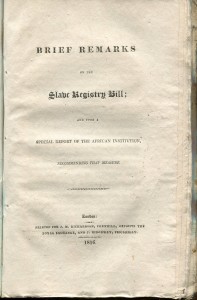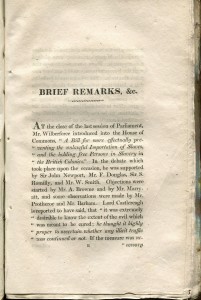Registering Slaves
[Posted by Brandon T. Lewis (’13), a student in Zak Sitter’s English course, “1816: A Romantic Microcosm”]
 J. M. Richardson and J. Ridgway published Brief remarks on the slavery registry bill: and upon a report of the African Institution, recommending that measure, in 1816 in London, England. The item was published in a very large blue book with a spine that may have been white when first published, but is now a tan-brown color due to its age. There are other published items in the book, most of them discussing religious persecution of Protestants occurring at the time. The book containing these items, including the one I selected, is called a “pamphlet”. The pamphlet shows considerable wear indicative of its age; the top and bottom of the spine have broken off, exposing the bindings that hold all of the documents together. There is a title on the spine of the pamphlet, reading “Tracts on Protestant…” but the end of the title has faded and is incomprehensible. The book’s cover has fragile attachment to the pamphlet. The edges of the pages inside the pamphlet are very frayed, appearing to be broken and chipped. While there are some stains, the pages themselves are in relatively good condition, even though it was clear that I needed care when navigating the book.
J. M. Richardson and J. Ridgway published Brief remarks on the slavery registry bill: and upon a report of the African Institution, recommending that measure, in 1816 in London, England. The item was published in a very large blue book with a spine that may have been white when first published, but is now a tan-brown color due to its age. There are other published items in the book, most of them discussing religious persecution of Protestants occurring at the time. The book containing these items, including the one I selected, is called a “pamphlet”. The pamphlet shows considerable wear indicative of its age; the top and bottom of the spine have broken off, exposing the bindings that hold all of the documents together. There is a title on the spine of the pamphlet, reading “Tracts on Protestant…” but the end of the title has faded and is incomprehensible. The book’s cover has fragile attachment to the pamphlet. The edges of the pages inside the pamphlet are very frayed, appearing to be broken and chipped. While there are some stains, the pages themselves are in relatively good condition, even though it was clear that I needed care when navigating the book.
There is no author specified for the piece, but it can be assumed that the author had access to the meeting of Parliament. The document is about the introduction of a bill to the House of Commons that would prevent illegal trading of slaves in the British colonies. The bill was introduced by William Wilberforce, considered a leader of the movement to stop the trading of slaves in the British Empire. The bill was created as a measure to stop illegal slave trading in outside territories, particularly Jamaica. In 1807, Parliament passed the Slave Trade Act, which made the slave trade illegal throughout the British Empire. However, there was evidence that West Indian countries were still participating in the slave trade, hence the need for a slave registry. It is important to note that only the trading of slaves was deemed illegal in the Empire. Slavery itself would not be illegal until 1833, with the passing of the Slavery Abolition Act.
Lord Castlereagh, also known as Robert Stewart, was Leader of the House of Commons and noted the significance the bill would have. He believed that the passing of the bill would ultimately lead to the abolition of the slave trade altogether, something that he supported wholeheartedly. Lord Castlereagh also presented the opposition to the bill, coming from Jamaica. Their parliament believed that the new law proposed would violate and infringe on their constitutional rights.
 What drew me to this item was the chance to learn about how slavery was enacted, or abolished, in countries others than the United States, which my knowledge was primarily limited to. A lot of what I learned from the “brief remarks” came from the author’s own commentary on the bill. In his analysis of Lord Castlereagh’s comments, he said, “every prudent man would deprecate the unnecessary introduction of a question which separated this country the United States of America”. The author also expressed concern amongst the government that the British Empire could risk losing the West Indian colonies if they pushed more rules and regulations on them. The author seemed to believe that passing the bill without having sufficient enough evidence would be detrimental due to the backlash it would. The author note that, despite the general weakness of West Indian colonies in terms of military forces, it would be foolish of the government to underestimate their abilities to try to claim independence. Referencing the United States once again, the author poses the possibility of the United States attempting to gain control of Jamaica, in an effort to strengthen their naval power.
What drew me to this item was the chance to learn about how slavery was enacted, or abolished, in countries others than the United States, which my knowledge was primarily limited to. A lot of what I learned from the “brief remarks” came from the author’s own commentary on the bill. In his analysis of Lord Castlereagh’s comments, he said, “every prudent man would deprecate the unnecessary introduction of a question which separated this country the United States of America”. The author also expressed concern amongst the government that the British Empire could risk losing the West Indian colonies if they pushed more rules and regulations on them. The author seemed to believe that passing the bill without having sufficient enough evidence would be detrimental due to the backlash it would. The author note that, despite the general weakness of West Indian colonies in terms of military forces, it would be foolish of the government to underestimate their abilities to try to claim independence. Referencing the United States once again, the author poses the possibility of the United States attempting to gain control of Jamaica, in an effort to strengthen their naval power.
Given the year of this item’s publication, I found the comment very indicative of the concerns Britain had over the stability of its empire. Forty years prior, the United States of America succeeded from the empire because they believed the empire was imposing intolerable rules and tariffs on them. The quote I reference in particular carries a hint of lingering ire regarding Britain’s loss in the American Revolution. It also speaks to the concerns of at least some that the war with United States was the beginning of a gradual decline in the Empire’s global power. It was a fear so strong that losing Caribbean colonies would be catastrophic enough to have Parliament reconsidering exerting its power over them.
While the document itself is specifically about a single event, it goes to show how one piece of literature can be truly indicative of a country’s past, present, and future, as mine was.